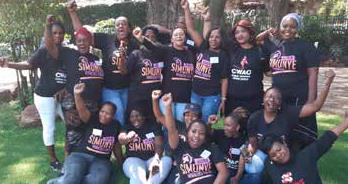Thirty Community Healthcare Workers (CHWs) from all over the country came together at the House of Movements to participate in a National Organising Workshop together with six Khanya College staff. The workshop, starting in the evening of 17 October 2019, is an introduction to organising – the role of an organiser, what an organiser should do – and also looks at reasons why the working class needs to organise itself. Comrades Maria van Driel and Innocentia Mathebula of Khanya College facilitated the opening part of the workshop which consisted of exercises such as meditation and a game testing listening skills and memory.
On Day Two the participants profiled the organisations they come from as CHWs in different provinces. Participants also had time to read the featured literature and later, through breakaway groups to discuss different questions or topics relating to organising, capitalism its impact, context, etc.
During plenary, groups said that they organise because they want to “put things together” and be able to do research and to ensure they do not miss out on the important things. Participants noted apolitical forms of organising including parties, graduation and baptism ceremonies, matriculation dances and stokvels, etc. Others referred to social events such as funerals and soup kitchens.
Essentially, organisers follow a process by planning and coordinating things to create order and sequence for a purpose. In organisations, organisers work with and within a given budget while they also monitor and do evaluation. Communication skills are important for this role.
Reasons for organising, according to participants, include working together to achieve common goals. One group said it is in order to keep things on track and to implement plans while another group said the working class needs to organise “because the ruling class does not take us seriously.” Importantly, the working class needs to speak in one voice.
Since organising does not take place in a vacuum, participants looked at the context of capitalism, focusing on sub-topics such as ‘Capitalism as a system of crisis’ and women’s oppression.
Obstacles for organising in South Africa in this period is increasing unemployment, long working hours, exploitation. The workshop further looked at the context of, and challenges facing specifically CHWs and working class women. Another area of focus is the impact capitalism has had and continues to have on working class women and CHWs.
The workshop continues into Day 3 and ends on Saturday, 19 October in the evening.



